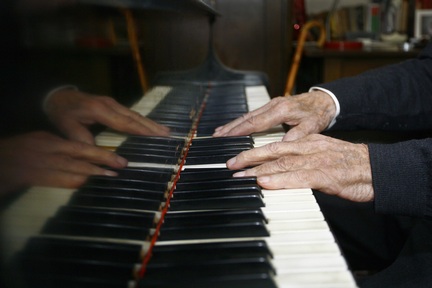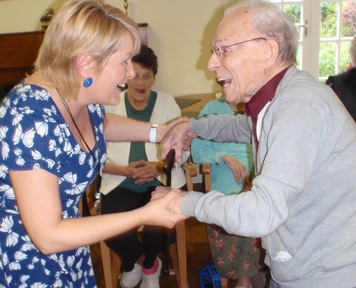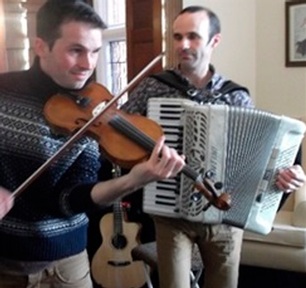Music therapy 'strikes a chord' for people living with dementia
Age UK has revealed that one of the most remarkable successes of music therapy is the impact it has on the lives of older people living with dementia.

Within care settings, both live and recorded music allows individuals to find an alternative means of expression through clapping, playing and humming.
Previous studies have shown that engaging in live music activities can enhance an individual’s well-being, reduce levels of stress, increase self-esteem and improve quality of life both for those being cared for and for the staff and family members around them.
Cellist Claire Garabedian, who is studying the effects of live and recorded music on people with dementia at the University of Stirling, has seen the transformation of people in care homes, who may appear to be in a ‘vegetative’ state. She said: “The simple activity of listening to music with at least one other person can engage and connect the listeners; regardless of their cognitive or physical status.
“Music has the capability of creating a sonic environment wherein listeners can be transported away from their current pain (be it psychological, emotional, or physical).
“Even when someone can no longer talk, music becomes an avenue for communication and engagement. It seems to access parts of the brain that remain unaffected by the ravages of dementia.”
According to the Alzheimer’s Society, 850,000 people are currently living with dementia in the UK, a number which is predicted to rise to over two million by 2051.
At present, a third of individuals living in care homes are affected by either dementia or significant memory problems. While there are no long-term cures, ways of alleviating symptoms, such as live music performances, are becoming widely available and accessible.
Lost Chord
Lost Chord is a registered charity which has been dedicated to improve the quality of life and well-being for people living with dementia since 1999. The organisation use live and interactive musical stimuli to increase an individuals’ general awareness and self-esteem.

The charity regularly visits 75 homes in South Yorkshire, Derbyshire, London, Cardiff, Coventry, Ipswich and Bury St Edmonds, providing more than 100 live music sessions a month.
Chief executive, Helena Muller, has suggested that regular sessions enable musicians to build and maintain relationships with the residents, allowing them to provide therapy and reminiscence. She said: “Usually a singer and an accompanist visit the care home; I encourage them to use a wide cross-section of music so there is something for everyone. It is important that they are flexible and adapt their repertoire to the needs of the residents and their carers.
“Residents are surrounded by constant piped music all day long and are also subject to the television being on all day. Therefore they become totally immune to its impact.
“It is only with the introduction of live music, performed by musicians who are prepared to use a very tactile approach, along with that of the volunteers by holding hands, kneeling down in front of them at their level and singing to them that you have any chance of stimulating some of the amazing responses we achieve at every session.
Ms Muller continued: “During one session we had a lady who was accompanied by her husband. She made no sense verbally but with a real individual approach she started to sing all the words to a familiar song.
“Her husband was in floods of tears as this was the first time he was able to understand her in years. They were encouraged to get up and dance together which was so emotional to witness.”
Music therapy
The power of music and singing to unlock memories is an increasingly significant feature of dementia care. It can reach parts of the damaged brain in ways other forms of communication cannot.
Yet, Ms Garabedian has highlighted that live music is most effective when the musician is trained in performing music in the care sector. She added: “In my practical and research experience, live music is always more effective if the musician is trained and has experience with understanding subtle non-verbal cues, so they can quickly respond to the listener by adjusting the volume, tempo, music genre, or allow space for silence.

“However, recorded music can be as positively effective; again, if the person providing the music is trained and has experience with understanding subtle non-verbal cues, and is ready to respond and engage with the listener.”
The effects of music on people with dementia are well-documented. Professor Paul Robertson of the world-renowned Medici String Quartet has spent many years researching the relationship between music and dementia. He believes that music can unlock memories when recollections appear locked away, temporarily helping to reconnect people suffering from dementia while the music is playing.
“We know that the auditory system of the brain is the first to fully function at 16 weeks, which means that individuals are musically receptive long before anything else. So it’s a case of first in, last out when it comes to a dementia-type breakdown of memory,” he said.
Ms Garabedian believes more could be done to harness music therapies for residential, palliative and end-of-life care. She added: “The UK has a growing population and there is a real need now for non-pharmaceutical solutions.”
For more information about Lost Chord contact Helena Muller on 0779 0649 305 or 01709 8911160. Alternatively the website can be accessed at: http://www.lost-chord.org.uk/.
Latest Features News
 25-Nov-19
2019 Election: Boris Johnson leaves social care in 'too difficult box' but Labour vows to end 'crisis'
25-Nov-19
2019 Election: Boris Johnson leaves social care in 'too difficult box' but Labour vows to end 'crisis'
 18-Oct-19
Podcast: Wendy Mitchell and dementia: 'My biggest fear is not knowing who my daughters are'
18-Oct-19
Podcast: Wendy Mitchell and dementia: 'My biggest fear is not knowing who my daughters are'
 27-Sep-19
Exclusive: Care minister backs care workers' call for time off to grieve and attend funerals
27-Sep-19
Exclusive: Care minister backs care workers' call for time off to grieve and attend funerals
 19-Sep-19
Podcast: Gyles Brandreth says poetry helps ward off dementia
19-Sep-19
Podcast: Gyles Brandreth says poetry helps ward off dementia
 30-Aug-19
Edinburgh Fringe funnyman joins comics facing toughest audience at care home gig
30-Aug-19
Edinburgh Fringe funnyman joins comics facing toughest audience at care home gig